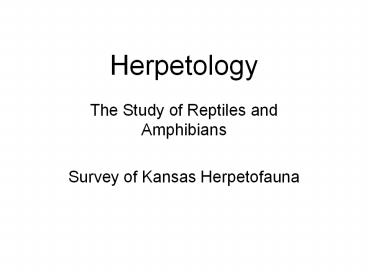Herpetology - PowerPoint PPT Presentation
1 / 84
Title:
Herpetology
Description:
Northern Water Snake Ringneck Worm Snake Brown Snake Common Garter Snake Plains Garter Snake Ribbon Snake Venomous Snakes of ... From Florida Can reach ... – PowerPoint PPT presentation
Number of Views:185
Avg rating:3.0/5.0
Title: Herpetology
1
Herpetology
- The Study of Reptiles and Amphibians
- Survey of Kansas Herpetofauna
2
Reptiles and Amphibians
- Snakes
- Lizards
- Turtles
- Crocodilians
- Frogs
- Toads
- Salamanders
3
Herps are Exothermic
- In the past called cold-blooded
- Rely on the environment for heat
- Requires less energy
- Need less food
- Hibernation
4
Amphibians
- Frogs
- Toads
- Salamanders
- Caecilians
5
Characteristics of Amphibians
- Moist skin
- No scales or shells or claws
- Need to keep skin wet or moist
6
Reproduction of Amphibians
- Salamanders
- Internal fertilization
- Frogs and Toads
- External fertilization
- Eggs have NO shell
- Hatch into tadpoles
7
Metamorphosis
- Tadpoles
- Aquatic - gills
- Frogs and Toads
- Terrestrial - lungs
8
Caecilians
- Legless amphibians
- Found only in tropics
9
Salamanders Order Caudata
- All in Kansas are mute
10
Tiger Salamander
- Kansas State amphibian
11
Smallmouth Salamander
- Diet is mostly earthworms
12
Eastern Newt
- Threatened Species, Miami and Linn Co.
13
Mudpuppy
- Totally aquatic
- External bushy gills
- Up to 15 inches
14
Frogs and ToadsOrder Anura
- More common in Kansas then salamanders
15
American Toad
- Belly is spotted
16
Woodhouses Toad
- Has not been recorded in Anderson Co. but has in
Allen, Coffey, Franklin, and Miami - May interbreed with the American Toad
- Belly not-spotted
17
Plains Leopard Frog
18
Southern Leopard Frog
19
Bullfrog
- Largest frog in state, up to 6 inches
20
Reptiles
- Snakes
- Lizards
- Turtles
- Crocodilians
21
Characteristics of Reptiles
- Dry scaly skin
- Feet have claws
- Do NOT depend on water like amphibians
22
Reproduction
- Most fertilize internally
- Lay eggs on land
- Some bear live young
23
Cloaca
- Opening that contains sex organs and excretory
organs
24
Amniotic Egg
- Prevents drying out
- Allows for laying on land
25
Turtles
- Order Testudines
26
Snapping Turtle
- Kansas Record 32 lbs
- Aquatic
- Will eat about anything
27
Alligator Snapping Turtle
- From Florida
- Can reach 175 lbs
- Rare in Kansas
28
Common Musk Turtle
- Semi-aquatic
- Active mostly at night
- Gives off a foul musk
29
Painted Turtle
- Semi-aquatic
30
Common Map Turtle
- Semi-aquatic
- Anderson Co. is one of only 6 were found
- Threatened Species protected by State Law
31
River Cooter
- Semi-aquatic
- Large, up to 15 inches
- Not reported in AC, but in Franklin Co.
32
Red-eared Slider
- Semi-aquatic
33
Eastern Box Turtle
- Terrestrial
- Omnivorous
- No reported in Anderson Co.
34
Ornate Box Turtle
- Kansas State Reptile
- Males have red or orange eyes
35
Snakes and Lizards
- Order Squamata
36
Lizards
37
Collared Lizard
- Eats mostly grasshoppers and moths
- Females have red-orange spots during pregnancy
38
Texas Horned Lizard
- Sometimes called Horny-toads
- Eats mostly ants and other sm. Insects
- Can squirt blood from its eyes
39
Skinks
- Can lose tail to avoid predators
40
Coal Skink
41
Five-lined Skink
42
Broadhead Skink
43
Great Plains Skink
44
Glass legless Lizard
- Largest lizard in Kansas
- Ear holes
- Will lose tail
45
Snakes
46
Fear of Snakes
- Ophidiophobia - An unnatural or unfounded fear of
snakes
47
Wildlife Laws Snakes
- It is Illegal to capture or kill snakes without a
permit
48
Snake Physiology and Characteristics
- Clear eye lids
- Not good vision
- Deaf, but can detect vibrations
49
Jacobsons Organ
- On roof of mouth
- Snakes taste the air
50
Ball Pythons
- Other snakes also have heat sensing pits
51
Constricting
- Most snakes in Kansas are constrictors
- They squeeze and suffocate prey
- What do they eat?
52
Eating
- Can disconnect top jaw from bottom
- Can swallow prey larger then their head
53
Swallowing
- Breathing hole
54
Common Snakes of Anderson Co.
55
Speckled (Common) Kingsnake
56
Prairie Kingsnake
57
Great Plains Rat Snake
58
Yellow-Bellied Racer
59
Juvenile Yellow Bellied Racer
60
Rough Green Snake
61
Red Milk Snake
62
Black (western) Rat Snake
63
Juvenile Rat Snake
64
Bull (Gopher) Snake
65
Coachwhip
66
Northern Water Snake
67
Ringneck
68
Worm Snake
69
Brown Snake
70
Common Garter Snake
71
Plains Garter Snake
72
Ribbon Snake
73
Venomous Snakes of Anderson County
74
Pit Vipers
- Includes Rattlesnakes and Copperheads
- Pits between nostrils and eyes
- heat detectors
- Sense minute temperature changes
- Helps find prey
75
(No Transcript)
76
Venomous Snake Bite Stats
- About 1 in 1000 is fatal
- 40 of victims are drunk
- In Kansas, 1 death since 1950
77
Snake Bite
- What should you do and NOT do?
78
Copperhead
79
Massasauga Rattlesnake
80
Timber Rattlesnake
81
Prairie Rattlesnake
- (only in western Kansas)
82
Cottonmouth
- AKA Water Moccasin
- Only in SE corner of Kansas
83
Coral Snake
- Red to Yellow
- Not in Kansas
84
(No Transcript)































